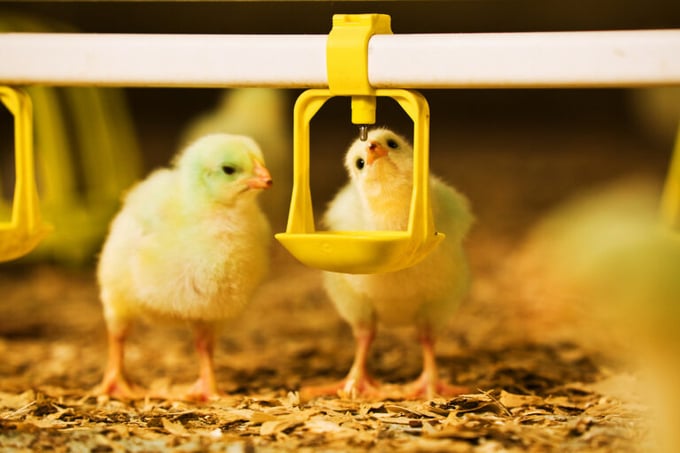December 1, 2025 | 16:52 GMT +7
December 1, 2025 | 16:52 GMT +7
Hotline: 0913.378.918
December 1, 2025 | 16:52 GMT +7
Hotline: 0913.378.918

Biosecurity is crucial in preventing avian influenza from entering a farm. Ensuring access to clean drinking water is a key part of these measures. Photos: Intracare.
Avian influenza is a virus that occurs naturally among wild aquatic birds. Infected birds can shed the virus in their nasal secretions, saliva and feces, which can infect domestic poultry species. This leads to severe consequences for animal health, welfare and production as well as great financial losses.
Biosecurity is crucial in preventing both highly pathogenic avian influenza and low pathogenic avian influenza from entering a farm. Strict hygiene measures apply to farmers, staff, and visitors. When highly pathogenic avian influenza is detected, immediate action is required to prevent its spread, including culling, surveillance, and quarantine.
The virus can survive for long periods on surfaces, requiring regular biosecurity reviews with veterinarians and farm staff. Effective biosecurity starts with identifying entry points, limiting movement of poultry and personnel, and thorough cleaning and disinfection.
The Intra Hygiene Programme offers the an effective cleaning and disinfection solution. As every farm situation can differ, contact your local distributor or Intracare for specific advice.
How does the bird flu spread?
The virus can enter the body through the eyes, nose, mouth, or by inhaling contaminated dust or droplets. Outbreaks of avian influenza often occur in the fall and winter when migratory birds, especially waterfowl, travel to Europe, Asia, and Africa. These birds can carry the virus without showing symptoms and spread it to others through saliva, nasal discharge, feathers, and feces.
Domesticated birds can become infected by avian influenza through several routes:

Essential biosecurity measures to protect your farm against the bird flu
It is essential to follow a strict biosecurity protocol to prevent avian influenza virus from entering the farm. This is a fundamental step in how to protect your birds from infection, ensuring that the right products are used at the right time. The following protocol details the necessary steps and products to ensure maximum biosecurity.
Steps in cleaning and disinfection:
(Poultryworld)

(VAN) The Provincial Competitiveness and Governance Index (PCGI) is a tool designed to reflect the quality of local governance.

(VAN) An environmental expert has outlined eight strategic actions for Vietnam to successfully meet its commitment to achieve Net Zero emissions by 2050.

(VAN) After the institutional merger, Da Nang possesses significant forest-carbon reserves and is proactively engaging in the carbon market, creating a new revenue stream.

(VAN) An Giang strengthens communication against IUU fishing, increases inspections and sanctions, and is determined to remove the EC’s “yellow card” while developing a sustainable fisheries sector.

(VAN) As green transition becomes a global trajectory, Viet Nam’s biggest challenge is not only technology and models, but how to ensure that capital flows reach the right beneficiaries.

(VAN) The Ministry of Agriculture and Environment must spearhead the construction of green governance, spanning decision-making processes and investment standards to policy evaluation mechanisms.

(VAN) The Agriculture and Environment sector of Khanh Hoa has achieved numerous milestones over the past 80 years, contributing significantly to the goal of establishing the province as a centrally governed city by 2030.